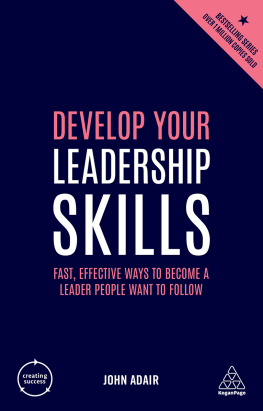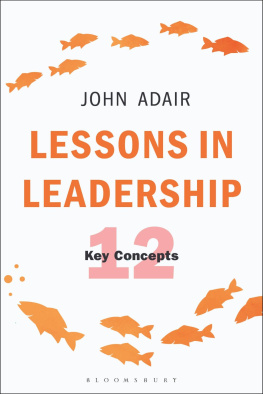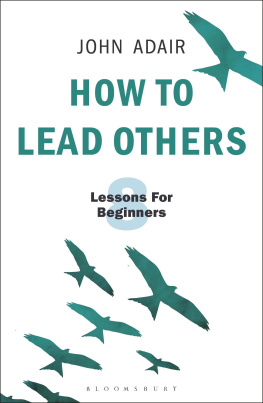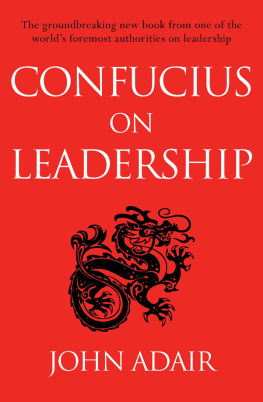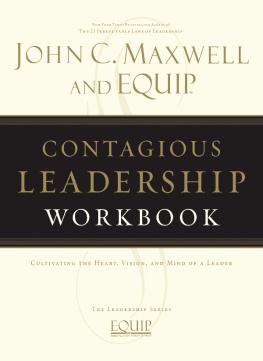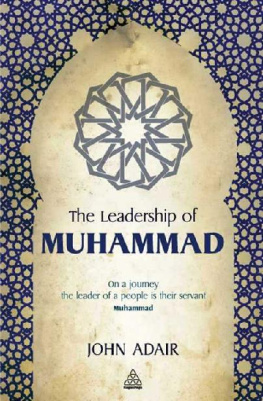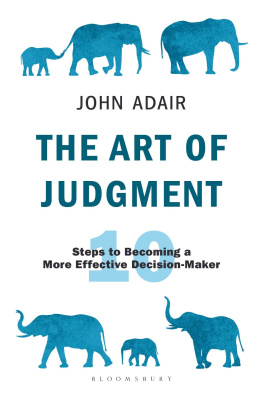Contents
Landmarks
Page List

Creating Success Series
Dealing with Difficult People Roy Lilley
Decision Making and Problem Solving John Adair
Develop Your Leadership Skills John Adair
Develop Your Presentation Skills Theo Theobald
How to Manage People Michael Armstrong
How to Manage Projects Paul J Fielding
How to Organize Yourself John Caunt
How to Write a Business Plan Brian Finch
How to Write a Marketing Plan John Westwood
How to Write Reports and Proposals Patrick Forsyth
Improve Your Communication Skills Alan Barker
Successful Time Management Patrick Forsyth
Taking Minutes of Meetings Joanna Gutmann
The above titles are available from all good bookshops.
For further information on these and other Kogan Page titles, or to order online, visit www.koganpage.com .
Contents
John Adair is the worlds leading authority on leadership and leadership development. Over a million managers worldwide have taken part in the action-centred leadership programmes he pioneered.
John had a colourful early career. He served as a platoon commander in the Scots Guards in Egypt, and then became the only national serviceman to serve in the Arab Legion, where he became adjutant of a Bedouin regiment. He was virtually in command of the garrison of Jerusalem in the front line for six weeks. After national service he qualified as a deckhand in Hull and sailed an Arctic steam trawler to Iceland. He then worked as an orderly in the operating theatre of a hospital.
After being Senior Lecturer in Military History and Adviser in Leadership Training at the Royal Military Academy Sandhurst, and Associate Director of the Industrial Society, in 1979 John became the worlds first Professor of Leadership Studies at the University of Surrey.
Between 1981 and 1986 John worked with Sir John Harvey-Jones at ICI, introducing a leadership development strategy that helped to change the loss-making bureaucratic giant into the first British company to make 1 billion profit.
John has written over 50 books, translated into many languages. Recent titles include The John Adair Lexicon of Leadership and The Leadership of Muhammad . Apart from being an author, he is also a teacher and consultant.
From St Pauls School he won a scholarship to Cambridge University. John holds the higher degrees of Master of Letters from Oxford University and Doctor of Philosophy from Kings College London, and he is also a Fellow of the Royal Historical Society. Recently, the Peoples Republic of China awarded him the title of Honorary Professor in recognition of his outstanding research and contribution in the field of Leadership.
Leadership skills have now been universally recognized as a key ingredient some would say the key ingredient in management. A good manager is now by definition a leader. Equally, a good leader will also be a manager.
But how do you become such a leader? Is it possible to develop your own abilities as a leader? Let me answer that last question with a resounding YES. As for the first question, this whole book is my answer. It is a simple practical guide for anyone who is about to take up a team leadership role in any organization. But I hope that it will be equally useful for those already in such roles who wish to improve their basic leadership skills. If leadership matters to you, this book will give you a complete framework for becoming an effective leader.
One word of caution: nobody can teach you leadership. It is something you have to learn. You learn principally from experience. But experience or practice has to be illuminated by principles or ideas. It is when the sparks jump between the two that learning happens. So you will have to think hard, relating what I say to your experience as you read and reflecting on it. As with everything else in life, the more you put into this joint exploration of practical leadership, the more you will get out of it.
Let me add a bold claim for this short book. People often debate the differences and similarities of leadership and management. But the majority of practical people are interested primarily in what they have to do, and not whether it should be labelled leadership or management or both. As a Chinese proverb says, What does it matter if a cat is black or white, as long as it catches mice? This is the book for such leaders. It is the first really successful synthesis of the concepts of leadership and management. At last there is a single integrated vision, a focus that encompasses both perspectives.
Lets start with the most basic question of all: why is it that one person rather than another emerges, or is accepted, as a leader within a group? In other words, what is leadership? The reason for starting here is that becoming clearer about the nature and role of leadership is the biggest step that you can take towards improving your own leadership skills. In the exercise below, give up to five responses to that question.
Exercise
What is leadership?
____________________________________________
____________________________________________
____________________________________________
____________________________________________
One traditional answer to that question which may be reflected in what you have written in the box is that the person in mind has certain leadership qualities . These traits, such as courage or tenacity, tend to make people leaders in all circumstances. They are natural or born leaders.
There are two difficulties to this approach:
If you compare all the lists of leadership qualities available in studies or books on the subject, you will notice considerable variations. That is not surprising, because there are over 17,000 words in the English language that describe personality and character.
The assumption that leaders are born and not made is not going to help you much.
Remember that young person whose annual report stated that Smith is not a born leader yet! Moreover, this assumption is not true. Naturally we do differ in terms of our potential for leadership, but potential can and should be developed. If you work really hard at leadership, your skills will become more habitual or unconscious. Then people will call you a natural leader.
You cannot leave personality and character out of leadership. There are some qualities that you have to have. Basically you should possess, exemplify and perhaps even personify the qualities expected or required in your working group. I have emphasized that because it is so fundamental. Without it you will lack credibility. (Incidentally, here is one of the first differences between leaders and managers: the latter can be appointed over others in a hierarchy regardless of whether or not they have the required qualities.)
Exercise
For this exercise, in the space opposite make a list of five qualities expected in those working in your field. Check it out with colleagues. Having done this exercise myself many times for example, with production workers, sales staff, nurses, engineers and accountants I expect that you will not find it too difficult. Notice that words may vary hard-working and industrious, for example but the concepts of the traits, qualities or abilities remain the same. Then rate yourself for the qualities that you identified.

